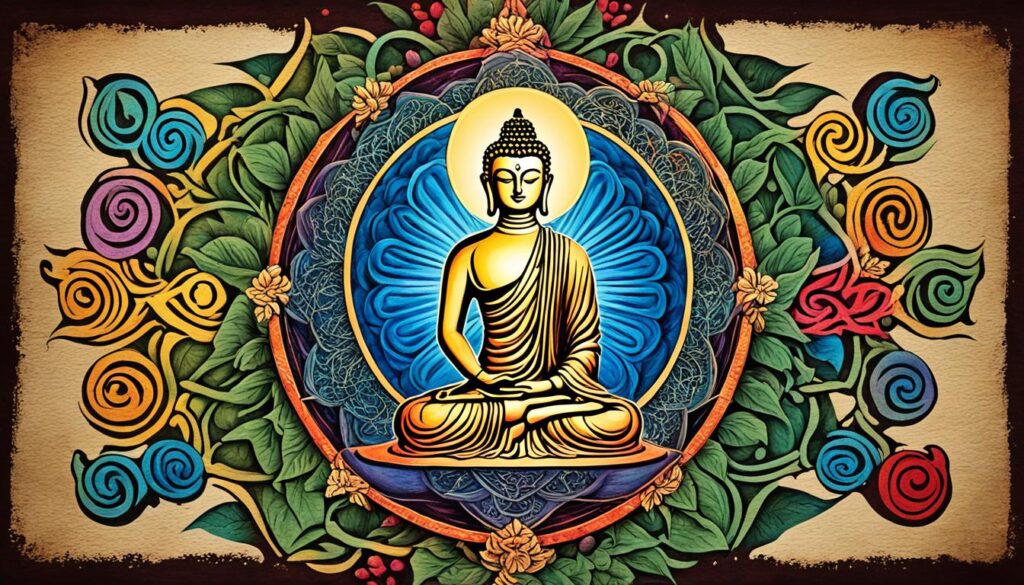Are you seeking mindfulness and compassion in the face of modern challenges? Do you yearn for personal harmony within yourself and societal harmony in the world around you? In your quest for spiritual growth, have you explored the profound teachings of Samsara Buddhism?
Samsara Buddhism offers invaluable insights and practices to navigate the complexities of life, leading you towards enlightenment and liberation from suffering. At its core, Samsara Buddhism emphasizes the transformative power of the Eightfold Path, a comprehensive guide for living a life of wisdom, ethical conduct, and mental discipline. But what exactly is the Eightfold Path, and how can it bring harmony and fulfillment to your spiritual journey?
Discover the essence of the Eightfold Path, explore its historical significance and origin, understand its role in Buddhism, and unlock the key to personal and societal harmony through this sacred spiritual practice.
Key Takeaways:
- The Eightfold Path is a practical and comprehensive approach in Buddhist philosophy that addresses the fundamental challenges of human existence.
- The path consists of eight principles including Right View, Intention, Speech, Action, Livelihood, Effort, Mindfulness, and Concentration.
- The Eightfold Path serves as a blueprint for personal and social well-being, leading practitioners towards enlightenment and liberation from suffering.
- It is the very essence and core of Buddhist practice and philosophy, guiding ethical conduct, mental discipline, and wisdom.
- By following the Eightfold Path, believers can cultivate mindfulness, compassion, and wisdom, transcending the cycle of rebirth and unlocking the path to enlightenment.
The Essence of the Eightfold Path
In Buddhist philosophy, the Eightfold Path holds tremendous significance as a practical
guide for personal development and ethical conduct. This comprehensive path offers
profound teachings that aim to free individuals from suffering and pave the way for
spiritual liberation. Each aspect of the Eightfold Path serves as a principle to guide
practitioners in their daily lives, fostering wisdom and mental cultivation.
The Eightfold Path encompasses eight key components:
- Right View: Cultivating an accurate understanding of the nature of reality
- Right Intention: Developing wise and compassionate intentions
- Right Speech: Speaking truthfully and avoiding harmful or divisive language
- Right Action: Engaging in ethical actions that promote well-being
- Right Livelihood: Choosing a livelihood that aligns with ethical principles
- Right Effort: Exerting oneself to cultivate positive qualities and let go of unwholesome habits
- Right Mindfulness: Cultivating present moment awareness and non-judgmental observation of experience
- Right Concentration: Developing focused and undistracted mental states for deepening insight and clarity
The interconnectedness of these eight aspects highlights the holistic approach of the
Eightfold Path. By integrating ethical conduct, mental cultivation, and wise discernment,
practitioners can navigate the complexities of life, fostering personal development and
ultimately attaining wisdom and freedom from suffering.
The Path to Wisdom
At the heart of the Eightfold Path lies the pursuit of wisdom. Through cultivating the
right view, intention, and mindfulness, individuals develop a deep understanding of
themselves and the world around them. This wisdom enables them to make informed
choices, act in accordance with ethical principles, and cultivate mental clarity and
equanimity.
Moreover, the Eightfold Path serves as a practical guide for integrating these principles
into daily life. By embodying the teachings of the Eightfold Path, individuals can
transform their actions, thoughts, and attitudes, fostering personal growth and
enhancing interpersonal relationships.
A Table Summarizing the Eightfold Path:
| Aspect | Description |
|---|---|
| Right View | Cultivating an accurate understanding of the nature of reality. |
| Right Intention | Developing wise and compassionate intentions. |
| Right Speech | Speaking truthfully and avoiding harmful or divisive language. |
| Right Action | Engaging in ethical actions that promote well-being. |
| Right Livelihood | Choosing a livelihood that aligns with ethical principles. |
| Right Effort | Exerting oneself to cultivate positive qualities and let go of unwholesome habits. |
| Right Mindfulness | Cultivating present moment awareness and non-judgmental observation of experience. |
| Right Concentration | Developing focused and undistracted mental states for deepening insight and clarity. |

Historical Context and Origin of the Eightfold Path
The Buddha, also known as Siddhartha Gautama, taught the Eightfold Path 2,500 years ago after attaining enlightenment. This path holds historical significance as it forms an integral part of the Four Noble Truths, which are the foundational teachings of Buddhism. The Eightfold Path represents a transformative shift from ritualistic and dogmatic practices to a more introspective and self-empowering approach to spirituality.
One significant historical event related to the Eightfold Path is the Buddha’s first discourse at Deer Park in Sarnath. It was here that he shared his profound teachings with a group of five ascetics, marking the beginning of his teaching career. This pivotal moment laid the foundation for what would become a global spiritual tradition encompassing millions of followers.

By emphasizing personal responsibility and inner transformation, the Eightfold Path challenged the prevailing ritualistic practices of the time. It offered a self-empowering approach to spirituality, rooted in self-reflection and the cultivation of wisdom, ethics, and mindfulness.
This shift in perspective allowed individuals to take an active role in their own spiritual journey, breaking free from external authorities and relying instead on their own insights and experiences. The Eightfold Path laid the groundwork for a new era of spiritual exploration, where individuals could navigate their personal paths in pursuit of enlightenment.
Today, the historical significance of the Eightfold Path is undeniable. Its teachings continue to inspire and guide millions on their own spiritual paths, as they explore the depths of their consciousness and strive for personal and societal harmony.
| Key Points | Highlights |
|---|---|
| The Buddha’s teaching of the Eightfold Path | 2,500 years ago |
| Integral part of the Four Noble Truths | Foundational teachings of Buddhism |
| Shift from ritualistic and dogmatic practices | Towards a self-empowering approach to spirituality |
| Buddha’s first discourse at Deer Park in Sarnath | Marked the beginning of his teaching career |
| Foundation for a global spiritual tradition | Encompassing millions of followers |
The Role of the Eightfold Path in Buddhism
The Eightfold Path is not just another concept in Buddhism; it is the very essence and core of its practice and philosophy. This comprehensive path synthesizes ethical conduct, mental discipline, and wisdom, essential for attaining enlightenment. It guides practitioners in how they think, speak, act, and interact with the world. The Eightfold Path is central to the Buddhist way of life, serving as a guiding light for ethical and mindful living, and is fundamental to achieving the ultimate goal of liberation from suffering.
The Eightfold Path: A Blueprint for Enlightenment
At the heart of Buddhist practice lies the Eightfold Path, a practical guide for leading a meaningful and enlightened life. Each aspect of the path corresponds to a specific aspect of one’s existence, addressing both personal conduct and the cultivation of a clear and balanced mind.
- Right View: Developing an understanding of the Four Noble Truths and the nature of reality.
- Right Intention: Cultivating wholesome and altruistic intentions in all actions.
- Right Speech: Practicing honest, kind, and compassionate communication.
- Right Action: Engaging in ethical conduct and abstaining from harmful actions.
- Right Livelihood: Choosing a profession that aligns with one’s values and ethical principles.
- Right Effort: Cultivating the energy and determination necessary for spiritual growth.
- Right Mindfulness: Cultivating present-moment awareness and deepening insight.
- Right Concentration: Developing focused and tranquil states of mind through meditation.
By following the Eightfold Path, practitioners engage in a transformative journey that encompasses all aspects of life. It shapes their ethical conduct, interpersonal relationships, and personal growth, leading to liberation from suffering and the realization of ultimate truth.

Embracing the Eightfold Path allows individuals to integrate Buddhist principles into their daily lives, fostering harmony within themselves and their communities. Through the practice of ethical conduct, practitioners learn to relate to others with compassion, kindness, and understanding.
The Eightfold Path is not a mere philosophical discussion; rather, it is a path of action and transformation. It empowers individuals to cultivate qualities such as mindfulness, wisdom, and compassion, leading to personal and societal well-being.
Conclusion
In the cosmic symphony of samsara Buddhism, embark on a transformative spiritual journey that leads to enlightenment. This profound path invites you to explore the intricate dance of life, death, and rebirth with a mindful and compassionate heart. By embracing the Eightfold Path, you will discover a powerful roadmap that guides you towards personal and societal harmony.
As you walk the path, you cultivate mindfulness, deepening your understanding of the impermanence of all things. The wisdom gained from this spiritual practice allows you to see reality with new insights and views. Through the lens of samsara Buddhism, you come to appreciate the interconnectedness of all beings and the importance of extending compassion to both yourself and others.
The lessons of samsara Buddhism remind you that everything is in a constant state of flux, embracing the impermanence that is inherent in life. This awareness propels you on a journey of self-discovery, leading you towards the ultimate goal of enlightenment. Along the way, you find inner peace, liberation from suffering, and a profound sense of purpose.
FAQ
What is the significance of the Eightfold Path in Buddhist philosophy?
The Eightfold Path is a central teaching in Buddhism that provides guidance for living a wise, ethical, and disciplined life. It offers a comprehensive approach to address the fundamental challenges of human existence and leads practitioners towards enlightenment and liberation from suffering.
What are the components of the Eightfold Path?
The Eightfold Path consists of Right View, Right Intention, Right Speech, Right Action, Right Livelihood, Right Effort, Right Mindfulness, and Right Concentration. Each aspect represents a principle that guides practitioners in their daily lives, ultimately leading to personal and social well-being.
How does the Eightfold Path contribute to personal and ethical development?
The Eightfold Path serves as a blueprint for personal and ethical development in Buddhism. It emphasizes the interconnectedness of actions, thoughts, and attitudes, shaping one’s world experience. By following the path, practitioners cultivate mindfulness, compassion, and wisdom, contributing to their spiritual growth and liberation from suffering.
What is the historical significance of the Eightfold Path?
The Buddha taught the Eightfold Path 2,500 years ago after attaining enlightenment. It marked a shift from ritualistic and dogmatic practices to a more introspective and self-empowering approach to spirituality. The Buddha’s first discourse on the Eightfold Path at Deer Park in Sarnath laid the foundation for what would become a global spiritual tradition.
How does the Eightfold Path contribute to liberation from suffering?
The Eightfold Path is not just a concept but the very essence and core of Buddhist practice and philosophy. By guiding practitioners in their thoughts, speech, actions, and interactions, the Eightfold Path leads them towards ethical and mindful living. Following this path is fundamental to achieving the ultimate goal of liberation from suffering.
How does Samsara Buddhism contribute to personal and societal harmony?
Samsara Buddhism emphasizes mindfulness and compassion in navigating the intricate dance of life, death, and rebirth. By following the teachings of Samsara Buddhism, individuals cultivate profound insights into the nature of reality, impermanence, and compassionate action. This spiritual journey towards enlightenment promotes personal harmony and contributes to societal well-being.

